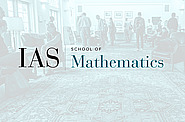Seminars
Feb
20
2018
Computer Science/Discrete Mathematics Seminar II
Some closure results for polynomial factorization
Mrinal Kumar
10:30am|Simonyi Hall 101
Feb
13
2018
Computer Science/Discrete Mathematics Seminar II
Model theory and ultraproducts
10:30am|Simonyi Hall 101
Feb
12
2018
Computer Science/Discrete Mathematics Seminar I
Nonlinear dimensionality reduction for faster kernel methods in machine learning.
Christopher Musco
11:00am|Simonyi Hall 101
Feb
06
2018
Computer Science/Discrete Mathematics Seminar II
Outlier-Robust Estimation via Sum-of-Squares
10:30am|Simonyi Hall 101
Feb
05
2018
Computer Science/Discrete Mathematics Seminar I
Locally Repairable Codes, Storage Capacity and Index Coding
Arya Mazumdar
11:00am|Simonyi Hall 101
Feb
01
2018
Theoretical Machine Learning Seminar
Two approaches to (Deep) Learning with Differential Privacy
Kunal Talwar
12:15pm|White-Levy Room
Jan
30
2018
Computer Science/Discrete Mathematics Seminar II
Explicit, Epsilon-Balanced Codes Close to the Gilbert-Varshamov Bound
Amnon Ta-Shma
10:30am|S-101
Jan
29
2018
Computer Science/Discrete Mathematics Seminar I
Explicit, Epsilon-Balanced Codes Close to the Gilbert-Varshamov Bound
Amnon Ta-Shma
11:00am|S-101
Jan
25
2018
Theoretical Machine Learning Seminar
Prediction and Control of Linear Dynamical Systems
Cyril Zhang
12:15pm|White-Levy
